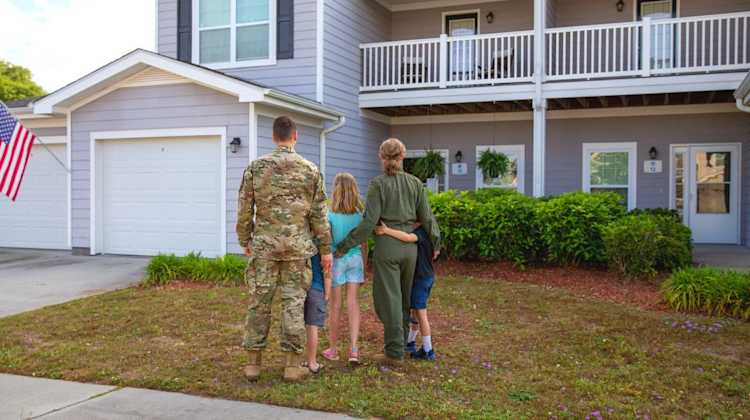Military Kids and School Moves Through a Pandemic: FAQ
by Amanda Trimillos - October 1st, 2021

Any normal year, nearly half of all military families would be gearing up for PCS season. However, this season is anything but normal. The COVID-19 crisis has consumed our country, if not the globe. Our new normal is living life on hold, while homebound and swallowing hefty doses of uncertainty with every news cycle. Many military families are in a hurry-up and wait phase, feeling helpless and anxiously awaiting the PCS process to continue.
The recent Stop Movement Order issued by the Department of Defense (DoD) delayed the ever precious Report No Later Date (RNLD), if not halted it completely. Deployments and homecomings delayed and moves are pushed back to late summer. But most parents know these timeframes are nothing but moving targets.
When changing duty stations means a school change for military-connected students, parents usually have more questions than answers. Throw in a world-wide pandemic and military families brace for more uncertainty than ever. We’ve put together Frequently Asked Questions to help parents navigate school transition through the COVID-19 crisis.
Will my kids be behind in academics next year?
The simple answer is no. Students will not be behind next year.
There are so many schools across the nation and the world who have no capability of providing assignments or providing instruction during this time. All schools will start next year with the expectation that students missed critical content. This content will be made up at that time.
These gaps in learning will bear no more weight on our students than any normal PCS to a school who teaches from a more academic or rigorous learning curriculum. The benefit families will find in fall is teachers will be more than understanding in the upcoming year when a new student enters the room having not had access to content. If families are concerned about students being behind in a COVID-19 PCS, the family may consider augmenting learning.
Some would even say that the COVID-19 school shut down across the world will actually allow students to race ahead. Perhaps these students will learn new social/emotional and life-skills that could never be taught in the classroom. Perhaps these students are able to take advantage of the free learning opportunities that are only available now during a pandemic – opportunities that will disappear the moment shut downs and Stop Movements are lifted.
Will the closing of schools this year make it more difficult to begin school in a new state next year?
In a normal PCS cycle, school changes are always challenging. This year, the challenge will be on a scale no one has ever experienced. Yes, this year will add more challenges to military families, but we are lucky because there are existing state policies and guidelines in place for military families through the Interstate Compact on Educational Opportunity for Military Children, or the Compact (MIC3) which apply to school changes – even during a pandemic. It’s also prudent to keep in mind schools will be faced with all new challenges when it comes to resuming academics in the classroom. Parents should pack their patience when it comes to communicating needs of their children to a new school. Get smart on what the Compact covers and what it does not, keep records, be organized and stay positive.
What if our school is closed and doesn't reopen before we move, what records or data should we carry with us for registration at a new school?
For many students, collecting data and records may be especially difficult during lockdown. While the Compact (MIC3) allows military families to hand carry education records from one school to another during transition, these policies will not override a Shelter In Place order.
First, contact the school or district office (with hope they respond) to request they assist you in allowing military-connected families to continue the tradition of hand-carrying important records to a new school and to schedule an appointment to pick up copies of all education records if possible.
In some cases, schools are simply closed for the duration of the state-mandated time period and no one is authorized to open the building to pull and copy a student’s records for military families. It is very possible families will move without hand carried records from the school. In this case we will want to update as much of our child’s education binder on our own.
Steps to take if parents cannot collect records from schools and good additions to any documents provided by schools:
Email teachers to explain a student is moving and will not return to their current school next year. Ask the teacher to e-mail you a letter parents can give to the receiving teacher at the new school. This letter should explain what type of learner a student is, academic strengths and weaknesses, and any other insights only a teacher can give. Ask the teacher to also send parents a list of specific skills the student can work on between now and the start of the school year to prepare for the next grade level on the off-chance that new school used virtual learning to finish off the 20/21 school year. This is especially helpful for K-6 students, but also applies to specific subject teachers in secondary school.
Email coaches and elective teachers requesting letters of recommendation. These letters will be used to help encourage placement at a new school. The letters may discuss skills shown pre-COVID-19 as well as ways the student has been able to hone his skills in a lockdown situation. Create a portfolio for each child with the following information:
Past report cards (past three years)
Standardized test results (SAT/ACT and state tests)
IEP documentation
Samples of work
Reading and math levels (K-6)
If available, course descriptions for core and elective courses (Secondary schools)
E-learning platforms screen shots to show grades and sample course work. This will be helpful to school counselors to know how students ended their previous year.
Don’t forget up-to-date immunization records
Our current school isn't providing many assignments but our new school has implemented virtual learning. Will we have to catch up?
Teachers will be understanding in the upcoming year if your new student enters the room having not had access to content. If a parent is concerned about being behind, it might be best to call the school or district office to ask their best advice. If they do not yet have a plan to integrate new students, a call from a military-connected family moving to their area may help initiate that plan. If possible, consider augmenting learning by tapping into one of the many free education sites made available only during the pandemic.
Will my student be held back or lose credits next year?
The initial answer is no, students will not be held back in the 2020/2021 school year. Students will advance to the next grade-level based on their grades earned throughout the time in classes. Some states are closing yearly grades effective on the first day of school shut-downs; some schools are using digital learning to be sure students have enough assignments to justify close-out final grades.
The students who may encounter challenges are middle and high school students who are enrolled in quarter rather than semester classes. It is likely that students never started these classes prior to school shut-down. These students may have no opportunity to complete quarter classes during school shut-down. The new school (and any school) will need to decide if these classes are mandated for graduation or if they can be waived under extreme circumstances of COVID-19. Depending on state mandates and graduation requirements, it is possible that these students will need to re-register and pass quarter classes prior to graduation.
With public schools, private schools, and homeschool curriculum using different standards, is this a bad time to change our type of school next year (from public school to homeschool or visa versa)?
This is as good a time as ever to switch. We anticipate that this shakeup will change the way many families look at education in the near and extended future. If a family is considering switching to a different learning system, take this opportunity to do just that. Do your research and take advantage of the free resources currently available.
If there are no end of the year state tests, can a child still receive the gifted and talented designation?
This is tricky. Designation is different at every school district level. Rarely will parents find identical standards or requirements for identification. What individual schools offer as Gifted programming can vary wildly from school to school in the same district. If an evaluation and recommendation is not completed by the time the school year closes out, identification will need to be pushed to the next school year. Most schools will accept a standardized IQ test not older than three years as part of the requirements. It might be best to schedule a private individual IQ test by a certified psychologist when available. Going into a new school with an IQ test score meeting district standards will fast track most identifications. If there isn’t an IQ test on file, then schools will require testing from their school psychologists before identifying a student for services which could take months due to the number of students waiting for testing. And remember, IQ score requirements also vary from school district so check incoming school’s guidelines for identification.
How will this affect Exceptional Family Member Program (EFMP) military kids or those with an Individualized Education Plan (IEP)? Anything parents should do to prepare for next school year, especially if it's in another state or school?
Military-connected children who are enrolled in EFMP and those with an IEP are probably already preparing for next school year. Students whose school has continued virtually through the lockdown are most likely working directly with their IEP teams. These families should request a virtual IEP meeting to update the student’s IEP with learning tools that were added to the IEP to meet the needs of a virtual environment. Since this was a fast and sudden adjustment, fast and sudden adjustments must have been made for IEP services. Questions parents should ask include: What new services were added? How have those new services helped? Would the student have been successful without those new services put into place? Which of these services can we continue when back in a traditional school? For example, the IEP team may have learned that the student benefits from using a Speak to Text feature when writing reports. This may be an accommodation that the team discusses continuing in an updated IEP.
If families move before an IEP review or transition meeting can take place, families will need to be sure to bring copies of the current IEP with them to a new school. This may also be a unique opportunity for requesting the previous IEP team to meet with the new IEP team, parents included, to discuss updates to goals and accommodations at a new school.
More questions?
We know parents and educators will have more questions as the weeks progress, but it’s important to understand the basics of school transition when moving forward, especially what the Compact covers for military connected students. There will be more questions about how schools handle credit transfers, end of course exams, grade point averages (GPA), sports tryout and extracurricular activities as the school year draws to a close and summer begins. It’s a time of uncertainty and confusion, but the underlying theme connecting our military kids and parents is our ability to find solutions. We will find our normal again and military kids will find their way into new schools and thrive once again. There is nothing we can’t handle as a community as long as we lean on each for help. Join our parents and educators support group on Facebook for specific questions and continued conversations focusing on COVID-19 and PCS moves, we are happy to help. Seasons of My Military Student Parent and Teacher Group K-12






